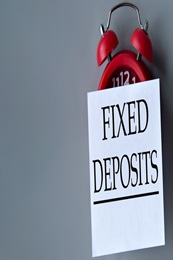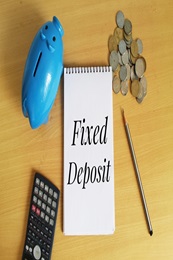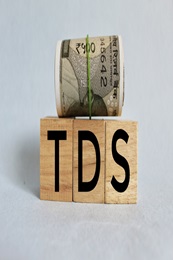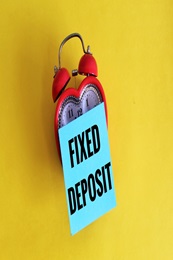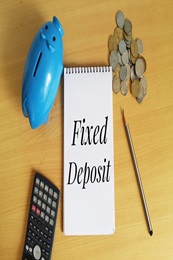Maximising Your Golden Years: Guide to Choosing the Best FD for Senior Citizens
April 15, 2025

Senior Citizen Fixed Deposit schemes are specifically designed for individuals aged 60 and above. These schemes offer higher interest rates, usually an additional rate up to 0.50%* p.a. over and above regular FD rates, ensuring senior citizens enjoy stable and secure returns on their investments.
Let's delve into some important highlights of these schemes:
1. Higher Interest Rates
Senior Citizen FDs come with additional interest rates. The interest rate varies across issuers, however, it’s generally up to 0.50% p.a.
2. Tenure
The tenure for senior citizen fixed deposits usually ranges from 7 days to a maximum of 10 years. However, it's always better to choose a tenure that's aligned to your financial objectives and goals. For instance, if you have short-term needs, you can book an FD for 12 months
3. Premature Withdrawals
Like Regular FDs, Senior Citizen FDs typically provide premature withdrawal facilities. However, FD issuers often levy a penalty on premature withdrawals, so it's important to consider this factor before making any hasty decisions.
Note: Ujjivan SFB does not levy any penalty fee for premature withdrawals made after 6 months from the time of deposit.
4. Loan against FD
One of the advantages of a Senior Citizen FD is that it can be used as collateral to obtain a loan. The maximum loan amount sanctioned depends on the principal amount of your FD. You repay the loan in fixed instalments over a specified period. The FD remains locked as collateral until the loan is fully repaid.
5. Overdraft against FD
Similar to loan against FD, overdraft against FD allows you to access funds with ease. However, you’re allowed to withdraw funds only up to a certain limit, which depends on the deposit amount. The interest is charged only on the amount you withdraw. There’s no fixed repayment schedule and you can withdraw funds from the overdraft facility multiple times until the limit is reached.
6. Flexible Interest Pay-outs
Non-cumulative Fixed Deposits offer flexible interest pay out options - monthly, quarterly or at the time of maturity. Seniors can opt for such FDs to generate a regular source of income post retirement.
7. Automatic Renewals
FD issuers offer the facility of automatic renewals at the time of maturity if no instructions are mentioned at the time of opening the account. The tenure for renewal will be the same as the existing FD account.
To make an informed decision about choosing the best Senior Citizen Fixed Deposit, it's crucial to calculate your potential returns. You can use a Fixed Deposit ROI Calculator to easily calculate your interest and overall returns. This will help you plan your investments better.
Understanding Senior Citizen Fixed Deposit Schemes
Senior Citizen Fixed Deposit schemes are specifically designed for individuals aged 60 and above. These schemes offer higher interest rates, usually an additional rate up to 0.50%* p.a. over and above regular FD rates, ensuring senior citizens enjoy stable and secure returns on their investments.
Let's delve into some important highlights of these schemes:
1. Higher Interest Rates
Senior Citizen FDs come with additional interest rates. The interest rate varies across issuers, however, it’s generally up to 0.50% p.a.
2. Tenure
The tenure for senior citizen fixed deposits usually ranges from 7 days to a maximum of 10 years. However, it's always better to choose a tenure that's aligned to your financial objectives and goals. For instance, if you have short-term needs, you can book an FD for 12 months
3. Premature Withdrawals
Like Regular FDs, Senior Citizen FDs typically provide premature withdrawal facilities. However, FD issuers often levy a penalty on premature withdrawals, so it's important to consider this factor before making any hasty decisions.
Note: Ujjivan SFB does not levy any penalty fee for premature withdrawals made after 6 months from the time of deposit.
4. Loan against FD
One of the advantages of a Senior Citizen FD is that it can be used as collateral to obtain a loan. The maximum loan amount sanctioned depends on the principal amount of your FD. You repay the loan in fixed instalments over a specified period. The FD remains locked as collateral until the loan is fully repaid.
5. Overdraft against FD
Similar to loan against FD, overdraft against FD allows you to access funds with ease. However, you’re allowed to withdraw funds only up to a certain limit, which depends on the deposit amount. The interest is charged only on the amount you withdraw. There’s no fixed repayment schedule and you can withdraw funds from the overdraft facility multiple times until the limit is reached.
6. Flexible Interest Pay-outs
Non-cumulative Fixed Deposits offer flexible interest pay out options - monthly, quarterly or at the time of maturity. Seniors can opt for such FDs to generate a regular source of income post retirement.
7. Automatic Renewals
FD issuers offer the facility of automatic renewals at the time of maturity if no instructions are mentioned at the time of opening the account. The tenure for renewal will be the same as the existing FD account.
To make an informed decision about choosing the best Senior Citizen Fixed Deposit, it's crucial to calculate your potential returns. You can use a Fixed Deposit ROI Calculator to easily calculate your interest and overall returns. This will help you plan your investments better.
Normal FD vs Senior Citizen FD Interest Rates: A Comparison
The interest rate offered varies across issuers. However, for ease of understanding, we have compared Ujjivan SFB's Digital Fixed Deposit interest rate and Senior Citizen FD interest rate (as on 1 July 2024).
| Tenure | Interest Rate (p.a.)* (Under ₹ 3 Crores) (For Normal Depositors) | Interest Rate (p.a.)* (Under ₹ 3 Crores) (For Senior Citizens) |
|---|---|---|
| 7 days to 29 days | 3.75% | 4.25% |
| 30 days to 89 days | 4.25% | 4.75% |
| 90 days to 180 days | 4.75% | 5.25% |
| 6 months to < 12 months | 7.00% | 7.50% |
| 12 months to < 18 months | 8.10% | 8.60% |
| 18 months | 8.25% | 8.75% |
| 18 months 1 day to 990 days | 7.75% | 8.25% |
| 991 days to 60 months | 7.20% | 7.70% |
| 60 months 1 day to 120 months | 6.50% | 7% |
*Disclaimer: Interest rates are subject to periodic changes and the applicable interest rates will be given based on the date and time of receipt of the funds by the Bank.
Choosing the Best FD for Senior Citizens: Factors to Consider
When selecting an FD plan as a senior citizen, it's important to consider various factors to ensure you make an informed decision. Here are some key factors to keep in mind:
1. Interest Rates
Compare interest rates offered by different banks and financial institutions. Look for competitive rates that provide maximum returns on your investment. Small Finance Banks like Ujjivan SFB offer higher interest rates on deposits.
2. Priority Banking Services
Having a peace of mind after retirement often transcends materialistic needs. Book an FD with a bank that offers convenience. Banks like Ujjivan SFB offer personalised care with doorstep banking and specialised banking solutions at their branches so the seniors can relax and carry out transactions with ease.
3. Interest Pay-out Options:
Evaluate the interest pay-out options. For non-cumulative FDs, the interest pay-out happens monthly, quarterly or at maturity based on your preference. While cumulative FDs offer interest pay-outs at the time of maturity. Choose an option that suits your cash flow requirements and provides regular income.
4. Premature Withdrawal Penalty
Check the penalty charges for premature withdrawal to ensure you have flexibility in case of emergency fund requirements. Just so you know, Ujjivan SFB doesn't levy any penalty fee for premature withdrawals made after 6 months from the time of opening your account.
Bonus Tip: How Senior Citizens Can Save TDS on Their Deposits
Tax Saver FDs lets you claim tax deduction up to ₹1.5 lakh under the Income Tax Act. The interest earned on these FDs are taxable. However, senior citizens can still earn tax-exempted returns, thanks to certain exemptions.
Excluding the 80C deduction, senior citizens are eligible to claim a deduction of up to ₹50,000 under Section 80TTB of the Income Tax Act, 1961 on their Tax Saver FD. However, the threshold is ₹50,000 and this may not be enough for senior citizens who primarily depend on interest income. Kindly note: For FY 2025-26, the current TDS exemption limit has been hiked to ₹1 lakh for senior citizens.
So, what should you do to maximise tax saving? Since you can invest only up to ₹1.5 lakh in a Tax Saving FD, instead of putting your money in one account, diversify your corpus across Tax Saving FDs. Just that you have to invest in a such a way that the interest earned stays within the ₹50,000 threshold. This could also help you earn better returns via reinvestments.
Let’s understand this with an example. For ease of calculation, we have kept the interest rate constant at 7% p.a. Assume that a senior citizen invests ₹1 lakh at an interest rate of 7% in a tax-saving FD. At the end of first year, he will earn an interest of ₹7,000. Since the interest income is less than the threshold of ₹50,000, the depositor does not have to pay tax on it. Additionally, no TDS is levied as senior citizens are eligible for tax exemption for interest income up to ₹50,000 in a financial year (till March 2025 - for FY 2025-26, the TDS exemption limit has been hiked to ₹1 lakh).
In the second year, ₹1,07,000 (first year’s interest + principal amount) is reinvested in the FD. The interest earned on the reinvested amount translated to ₹7,490. Simultaneously, depositor opens another FD of the same amount and at the same interest rate. At the end of 2nd year, his total interest income from both FDs would be ₹14,490. He can claim a tax deduction on this income under Section 80TTB. No TDS will be levied as the interest income from the fixed deposit is within ₹50,000.
Like this, he can earn tax-free returns for 5 years for an FD of ₹1 lakh at 7% p.a. Kindly check the below illustration for better clarity.
| Year | New Principal Amount (₹) | Balance at the Beginning of the Year (₹) | Interest Earned during the Year (₹) | Balance at the End of the Year (₹) | Maturity Amount (₹) |
|---|---|---|---|---|---|
| 1 | 1,00,000 | 1,00,000 | 7,000 | 1,07,000 | - |
| 2 | 1,00,000 | 2,07,000 | 14,490 | 2,21,490 | - |
| 3 | 1,00,000 | 3,21,490 | 22,403 | 3,43,893 | - |
| 4 | 1,00,000 | 4,43,893 | 31,071 | 4,74,965 | - |
| 5 | 1,00,000 | 5,74,965 | 40,249 | 6,15,213 | 1,40,255 |
Please note: The table is for educational purposes only. Ujjivan SFB doesn’t take responsibility of the accuracy of the information provided. Please consult a financial adviser before investing. Also, note that this TDS exemption on FD interest is applicable for FY 2024-25 (till March 2025). For FY 2025-26, the current TDS exemption limit has been hiked to ₹50,000 for regular citizens and ₹1 lakh for senior citizens.
At the end of the fifth year, the depositor’s first tax-saving FD will mature, and he will get a return of ₹1,40,255. The interest earned is ₹40,255 at the end of the fifth year. So, throughout the course of five years, his interest income from fixed deposits would remains below the limit of ₹50,000. The investor can claim a tax deduction of ₹50,000 under Section 80TTB every financial year while filing the income tax return. Also, there will be no loss due to TDS deduction for the entire 5 years.
Final Thoughts
Maximising your golden years requires careful financial planning. Booking an FD can be a wise decision as the principal amount and returns are not affected by market volatility. However, evaluate service charges, interest rates, additional benefits, etc., before booking an FD for senior citizens
Looking to grow your savings? Ujjivan SFB offers a wide range of fixed deposit products. Select the FD of your choice and take a step forward to your financial goals. Alternatively, you can browse through Ujjivan SFB product suite - our wide range of financial products are designed to make your financial life better.
FAQs
1. What is the best FD plan for senior citizens?
The best FD for senior citizens depends on factors such as interest rates, tenure, and additional benefits. It's recommended to compare rates and features across FD issuers before booking a Senior Citizen FD.
2. Is Senior Citizen Fixed Deposit tax-free?
No, the interest earned on Senior Citizen FD returns are subject to taxation as per the Income Tax laws.
3. How much tax exemption can senior citizens get on their deposits?
For tax-saver FDs, senior citizens can claim a deduction of ₹1.5 lakh under Section 80C of the Income Tax Act, 1961. Additionally, interest earned up to ₹50,000 is exempt from tax under Section 80TTB of the I-T Act. For FY 2025-26, the current TDS exemption limit has been hiked to ₹1 lakh for senior citizens.
4. Can I take a loan against my senior citizen FD?
Yes, you can use your senior citizen FD as collateral to obtain a loan. The maximum loan amount sanctioned depends on the principal amount of your FD.
5. Is the Senior Citizens Savings Scheme (SCSS) considered as a fixed deposit scheme?
The SCSS is not technically a FD scheme but rather a savings scheme specifically designed for senior citizens in India. While it shares similarities with FDs, it operates under a distinct government framework.
6. I have a deposit value of more than ₹3 Cr. What should I do to maximise my returns? Should I opt for bulk deposit?
Assuming you have a deposit value of more than ₹3 Cr, it’s better to split the amount in different FDs to reduce risk. Also, having multiple FDs with staggered maturities could provide more flexibility in accessing funds without incurring penalties. Additionally, by spreading your deposit across tenures, you can capitalise on better rates. This could also help you reduce your tax liabilities.
Latest Blogs

Telangana Housing Board & KPHB Colony: A Guide to Affordable Urban Housing in Hyderabad
March 14, 2025
As Telangana continues its rapid urbanisation journey, two key housing entities—Telangana Housing Board (THB) and Kukatpally Housing Board Colony (KPHB)—have played critical roles in shaping the state's real estate ecosystem.

Does Checking CIBIL Score Frequently Lower Your Credit Points?
April 07, 2025
Imagine you're planning to apply for a home loan, a credit card, or even a car loan. Naturally, you want to ensure your CIBIL score is in good shape before proceeding.

Explained: Can NRIs Buy an Agricultural Land in India?
April 03, 2025
Real estate investment is often a top priority for Non-Resident Indians (NRIs) looking to retain strong financial ties to India.

How to Improve Your CIBIL Score from 600 to 750: A Step-by-Step Guide
April 02, 2025
Your CIBIL score is like your financial reputation—banks check it before approving loans or credit cards. If your score is hovering around 600, you might face difficulties in securing credit or may get loans with higher interest rates.

What Happens When You Leave Your Savings Account Unused?
April 01, 2025
Imagine waking up one day to find that your hard-earned money is locked away and inaccessible. Sounds stressful, right? This is precisely what happens when you leave your Savings Account inactive for too long.

